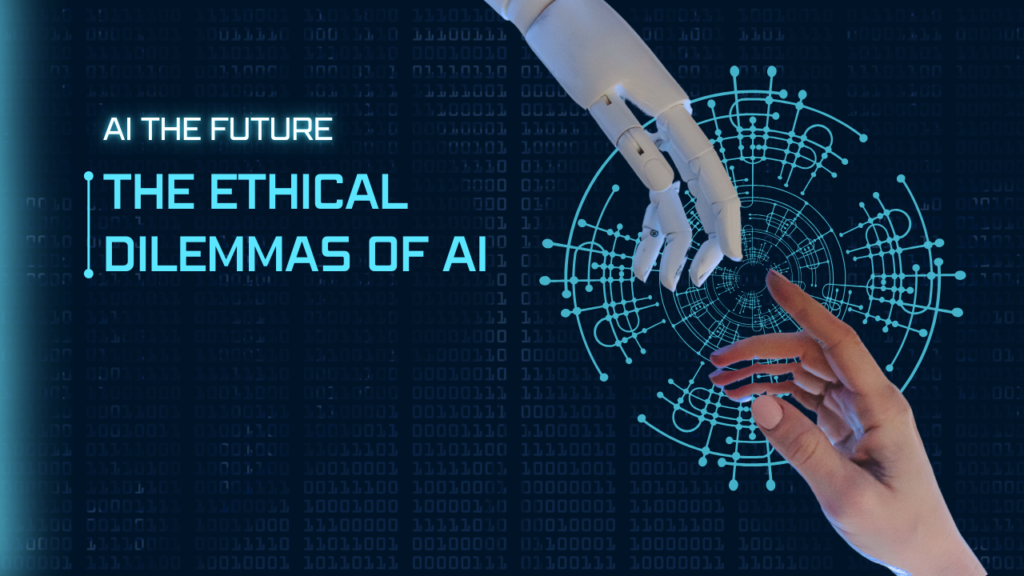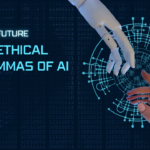Artificial Intelligence (AI) is no longer a futuristic concept—it is a present-day reality, shaping our lives in ways previously unimaginable. From autonomous vehicles to intelligent personal assistants, AI’s capabilities are growing at an unprecedented rate. However, this rapid advancement is not without its challenges. As AI technology continues to evolve, so do the ethical dilemmas surrounding its development and deployment. Striking a balance between innovation and responsibility is crucial to ensuring that AI serves humanity in beneficial and equitable ways.
The Double-Edged Sword of Innovation
AI has the potential to revolutionize industries, enhance efficiency, and improve quality of life. It can process vast amounts of data faster than any human, recognize patterns that would otherwise go unnoticed, and even make decisions in complex scenarios. These capabilities offer enormous benefits, from personalized medicine to predictive policing, from automated customer service to smart cities.
However, the very features that make AI so powerful also present significant ethical concerns. For example, in healthcare, AI can help diagnose diseases earlier and more accurately than human doctors. But if these systems are trained on biased data, they could exacerbate existing health disparities, leading to unequal treatment across different populations. Similarly, while predictive policing might reduce crime in some areas, it could also reinforce racial profiling if the algorithms are based on flawed or biased data.
The challenge, therefore, lies in harnessing AI’s potential while mitigating the risks it poses. This requires a careful consideration of the ethical implications at every stage of AI development, from data collection and algorithm design to deployment and beyond.
The Bias Problem
One of the most pressing ethical issues in AI is bias. AI systems learn from data, and if that data reflects existing social biases, the AI will likely perpetuate them. For instance, if an AI system is trained on hiring data from a company that has historically favored male candidates, the AI might recommend male candidates over equally qualified female candidates. This not only reinforces gender inequality but also undermines the fairness and integrity of the hiring process.
Bias in AI is not just a technical problem—it is a social one. Addressing it requires more than just better algorithms; it requires a fundamental rethinking of how data is collected, labeled, and used. Developers and companies must be aware of the potential biases in their data and take proactive steps to minimize them. This might include using diverse data sets, implementing fairness checks, and involving ethicists in the AI development process.
The Accountability Question
As AI systems become more autonomous, determining accountability becomes increasingly complex. Who is responsible when an AI system makes a mistake? Is it the developer who created the algorithm, the company that deployed it, or the AI system itself? These questions are particularly pertinent in high-stakes areas such as autonomous vehicles and healthcare.
For example, if a self-driving car causes an accident, it is unclear who should be held accountable. The car manufacturer might argue that the AI system was functioning as designed, while the system’s developers could claim that the car’s environment presented unforeseen challenges. This ambiguity complicates the assignment of responsibility and could lead to a lack of accountability.
To address this, there is a growing call for clearer regulatory frameworks that define accountability in AI systems. These frameworks should establish guidelines for AI development and deployment, ensuring that companies take responsibility for their AI products. Moreover, there should be transparency in how AI decisions are made, allowing users and regulators to understand and challenge these decisions if necessary.
The Privacy Concern
AI systems often rely on large amounts of personal data to function effectively. While this data can enable personalized services, it also raises significant privacy concerns. For example, AI-powered surveillance systems can monitor individuals’ movements and behaviors, potentially infringing on their privacy rights. Similarly, AI algorithms used by social media platforms can analyze users’ online activities to create detailed profiles, which can then be used for targeted advertising or even political manipulation.
The challenge here is to strike a balance between the benefits of AI-driven personalization and the need to protect individual privacy. This requires robust data protection laws, as well as ethical guidelines that prioritize user consent and data security. Companies should be transparent about how they collect, use, and store data, giving users more control over their personal information.
The Risk of Job Displacement
Another ethical dilemma posed by AI is the potential for job displacement. As AI systems become more capable, they are increasingly able to perform tasks that were once the domain of humans. While this can lead to increased efficiency and cost savings, it also raises concerns about the future of work. Millions of jobs in sectors such as manufacturing, retail, and customer service could be at risk, leading to widespread unemployment and social unrest.
To mitigate the impact of AI on employment, it is essential to invest in retraining and reskilling programs. Workers should be equipped with the skills needed to thrive in an AI-driven economy, such as digital literacy and critical thinking. Additionally, there should be a focus on creating new job opportunities in emerging fields, such as AI ethics and data science, that can complement AI technology rather than compete with it.
The Path Forward: Responsible AI Development
The ethical dilemmas of AI are complex and multifaceted, but they are not insurmountable. By prioritizing ethical considerations in AI development, we can create systems that are not only innovative but also responsible. This requires a collaborative effort between governments, companies, researchers, and civil society to establish ethical guidelines and regulatory frameworks that ensure AI is developed and deployed in a way that benefits all of humanity.
Responsible AI development also involves ongoing monitoring and evaluation of AI systems to identify and address any unintended consequences. This could include conducting regular audits of AI algorithms to check for bias, implementing accountability mechanisms to ensure that companies take responsibility for their AI products, and engaging with diverse stakeholders to understand the broader social impact of AI.
Conclusion
As AI continues to advance, the ethical dilemmas it presents will become increasingly pressing. Striking a balance between innovation and responsibility is crucial to ensuring that AI serves as a force for good rather than a source of harm. By addressing issues such as bias, accountability, privacy, and job displacement, we can pave the way for an AI-driven future that is both innovative and ethical. The choices we make today will shape the trajectory of AI development for years to come, making it imperative that we approach these dilemmas with care, foresight, and a commitment to the common good.





